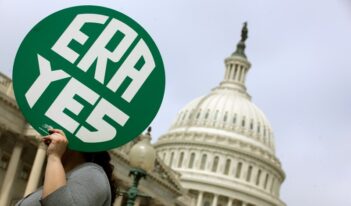
Court holds that agency fees are compelled speech prohibited by the First Amendment.
When Illinois Governor Bruce Rauner (R) took office, he surprised the state’s public unions by going on the attack. Declaring negotiations between the state and its workers’ unions to be a “corrupt bargain,” but facing a supermajority of Democrats in the state legislature, he had no hope of passing a bill to change Illinois labor law. Instead, he issued an executive order impounding union “agency fees”—fees deducted from employee paychecks and paid to unions to cover bargaining costs—while simultaneously suing in federal court for an order invalidating agency fees as impermissible compelled speech.
A federal trial court dismissed Rauner’s complaint for lack of standing, but allowed Mark Janus, an employee of the Illinois Department of Healthcare and Family Services, to intervene. The court then dismissed Janus’s case on merits, based on the 1977 U.S. Supreme Court decision in Abood v. Detroit Board of Education. In that case, the Court held that because Michigan and its municipalities had a legitimate interest in negotiating with an exclusive bargaining representative, an agency fee charged to employees who declined to join a union did not violate freedom of speech, so long as the fee did not pay for political activity. Janus appealed to the Seventh Circuit, where the judges agreed his claim was governed by Abood.
Despite that unpromising start to the litigation, Janus and his supporters, including the National Right to Work Foundation, had every reason to expect a better outcome at the Supreme Court. For in several cases over the past five years, the Court had signaled a willingness to reconsider Abood.
In 2014, the Court held in Harris v. Quinn that Abood would not allow Illinois to assess an agency fee on a Medicare-funded home-care personal assistant. Then, in January 2016, the Court heard oral argument in Friedrichs v. California Teachers Association, a case in which the petitioners directly challenged Abood, with the apparent support of five justices. But the next month Justice Antonin Scalia died, and in March 2016 the Court issued a one-sentence opinion stating that an evenly divided court upheld the lower court’s decision.
Thus the appeal in Janus v. AFSCME Council 31, considered by the Supreme Court this past term, became the next opportunity for the Court to reconsider Abood. With Justice Neil Gorsuch having assumed Justice Scalia’s seat, the Court’s decision overruling Abood came as no surprise.
Collective bargaining for public workers, according to the Court, involves speech on matters of public concern. An agency fee to support bargaining therefore represents a compulsory subsidy of political speech. The Court then rejected the arguments made by Illinois and its public unions that the state has a compelling interest in negotiating an agency fee to ensure “labor peace.”
Pushing the point further, the Court ruled that a state cannot collect an agency fee from any employee without first obtaining affirmative consent. That requirement—undoubtedly imposed to preempt legislation requiring public workers to opt out of an agency fee—is the clearest indication that a majority on the Court views public unions with hostility. Indeed, there is no other case on compelled speech holding that affirmative consent, as opposed to silent acquiescence, is essential to avoid a constitutional violation.
For additional reasons it seemed to Justice Elena Kagan, joined by three other dissenters in Janus, that the Court had singled out agency fees for special treatment under the First Amendment. In previous cases, she noted, the Court had established a balancing test permitting a public employer to regulate employee speech, even on subjects of public concern, provided it could show a legitimate workplace interest underpinning its policy.
It was especially unnecessary to target agency fees, which neither constrain nor compel speech, but rather merely subsidize it. As professors Eugene Volokh and William Baude pointed out in a friend-of-the-court brief, compulsory subsidies of speech are common, and almost never create a First Amendment issue. For example, the Court has upheld public university activity fees used to fund political student groups.
The economic argument in support of Illinois’s interest in agency fees also was strong. As explained in a separate brief submitted by 36 economists and professors of law and economics, an agency fee is necessary to protect collective bargaining from the problem of free riding. Absent a mandate, rational individuals will discontinue their voluntary financial support for a collective good—such as a union that negotiates for pay raises and benefits—even if they personally benefit from it, because they know their individual contribution will be small and they will enjoy any benefit irrespective of whether they contribute.
Public employees in Iowa provide a telling example of the free-rider problem. In 2017, 83 percent of Iowa’s eligible public workers voted in favor of unionization—but without a mandatory agency fee, 71 percent of eligible workers chose to be free riders who make no contribution at all.
Finally, there was Abood’s standing as binding precedent. In the 40 years since it was decided, the Court had cited Abood favorably many times. Dozens of states and hundreds of unions, representing hundreds of thousands of employees, have entered into collective bargaining agreements relying on Abood.
The majority in Janus, however, found all those years’ worth of experience unpersuasive. In their view, Abood was based on an “unsupported empirical assumption” that agency fees were necessary to achieve “labor peace,” and it was unreasonable for unions and states to rely on Abood after the decision in Harris. Moreover, the majority claimed, without apparently any intended irony, that debates over public spending “have given collective-bargaining issues a political valence that Abood did not fully appreciate.”
It is true that the Supreme Court’s decision to impose right-to-work law from the bench is unlikely to result in the demise of public unions. But few people, least of all the litigants, seem to doubt the decision will do unions real harm. One study projects that outlawing agency fees will result in a decline in public-sector union membership by 8.2 percent, a decrease in public schoolteacher salaries by 5.4 percent, and a loss in annual economic activity in the United States by at least $11 billion.
Do public unions have any political recourse?
Scholars Daniel Hemel and David Louk propose that unions lobby legislatures for a direct appropriation to cover expenses. It is an appealing idea, partly because, as Benjamin Sachs has argued, agency fees should have been treated as direct payments from legislatures to unions all along, at least for First Amendment purposes. Yet the distinction between an agency fee and a legislative appropriation is more than formalistic—the latter undoubtedly would represent an easier target for a politician like Bruce Rauner.
An alternative approach would be to ask why unions must act on behalf of non-dues-paying employees at all. It has been a pillar of American labor law that a union serves as an exclusive representative of a bargaining unit and therefore must represent all employees, even those who decline to become members. But there is nothing to stop a state from changing that requirement.
With new legislation, a state could bind itself to negotiate with any union representing a substantial complement of employees, regardless of whether it served as an exclusive representative, so long as the union did not discriminate against potential members on an impermissible ground such as race or gender. Each union could then seek to provide its members an advantage not offered to non-members, by negotiating not only job security and wage increases, but also distinctive benefits, such as contributions to a retirement plan.
In this way, unions could avoid the free-rider problem, though at the risk of losing some leverage in negotiations. Unions are unlikely to support such change right away. But a new model could lead to better marketing and, eventually, stronger membership. At the very least, the proposal would renew consideration of labor law in the political sphere, where it has always belonged, rather than in the courts.
This essay is part of a series, entitled The Supreme Court’s 2017–2018 Regulatory Term.




